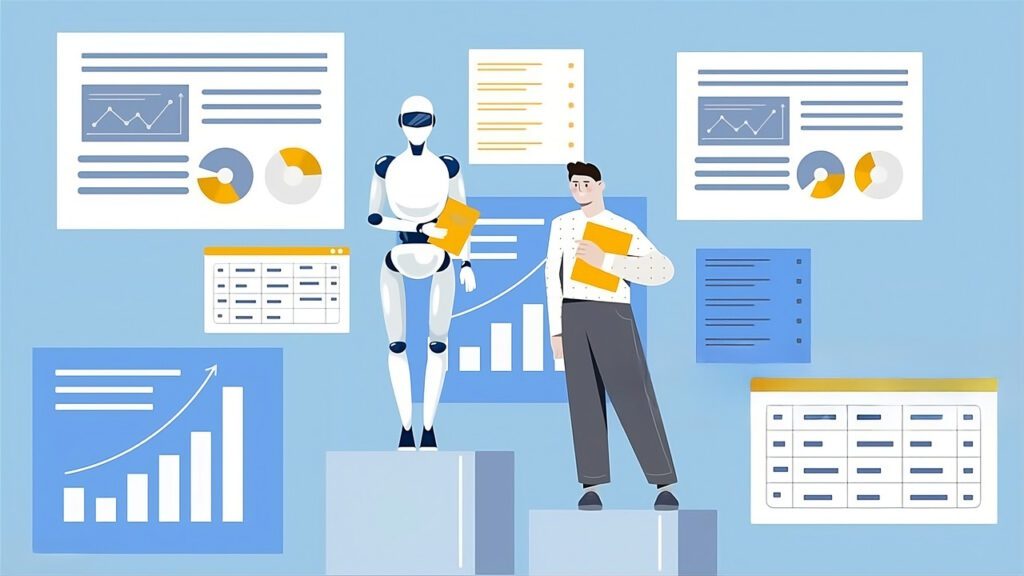
In 2025, leaders want results, not buzzwords. Teams ask what will cut time, reduce costs, and lift quality. The best ai tools for business do that by turning data into action, by answering customers fast, and by removing repeat work.
You will see how to match goals to tools, how to start small, and how to scale once you have proof.
This guide walks through the best ai tools for business, shows where ai assist shines, and points to the smartest ai for the jobs that matter.
Table of Contents
ToggleWhy best ai tools for business now matters to every team
AI helps you move faster and make fewer mistakes. It also gives managers a clear view of what is working. When used well, the best ai tools for business become quiet helpers that work in the background all day.
Study: Internal program reviews often show that a small pilot with two or three technology tools wins more support than a big plan. Leaders back what they can measure.
How we chose the best ai tools for business in this guide
We looked for tools that are easy to try, quick to show value, and ready to scale. We also checked that each tool fits with common stacks and has useful support. That is what matters when you pick the best ai tools for business rather than a shiny demo.
- Clear setup and simple use
- Real automation, not just new screens
- Fits companies of many sizes
- Broad features that help more than one team
- Proven results shared by users
Best ai tools for business that change daily work
Below are seventeen picks that show up often in plans for growth, service and smart ops. You can mix a few of them for a full stack. Several also count as top ai cloud business management platform tools, which makes rollout easier.
1. Jasper AI
Help content teams write clear copy and keep tone on brand. Good for emails, ads and posts.
Why it helps
Faster drafts mean more tests and better reach. This is where ai assist pays off for marketing.
2. Salesforce Einstein
Adds guidance to your customer system. Scores lead, spots risk and help forecast.
Why it helps
Sales teams focus on the right actions. One win can pay for a year.
3. Grammarly Business
Checks clarity and tone for teams that write all day.
Why it helps
Fewer rewrites, better results and a shared voice across the company.
4. ChatGPT Enterprise
A secure assistant for support, HR, legal notes and research. It connects to your own data when you allow it.
Why it helps
Cuts response time and gives every team a quick ai assist.
5. ClickUp AI
Add summaries and action items to your work hub. Help projects stay on track.
Why it helps
Less time in status meetings and more time shipping.
6. UiPath
Automates repeat steps in finance, ops and HR. Reads documents and moves data between systems.
Why it helps
This is core ai for automation. It frees people to fix exceptions instead of pushing buttons.
7. Zoho Zia
An assistant that lives through Zoho apps for sales, service and finance.
Why it helps
Small and mid-teams get broad help from one place.
8. Xero with AI
Automate reconciliation and speed up invoicing for growing firms.
Why it helps
Clean books without late nights.
9. Tableau with Einstein
Find patterns and explain trends inside your dashboards.
Why it helps
Leaders get answers without waiting on a new report.
10. ADP DataCloud
Gives HR a view of churn risk, pay ranges and talent gaps.
Why it helps
Better plans, fewer surprises.
11. Gong
Shows what top sales calls have in common and flags deal risk.
Why it helps
Better coaching in less time.
12. Otter
Captures meetings and writes clean notes with action items.
Why it helps
Everyone leaves with the same plan.
13. Tidio
Chat and chatbot in one for support and store fronts.
Why it helps
Always on help without a bigger team. Good use of ai assist for commerce.
14. IBM Watson
A deep platform for research teams and complex workflows.
Why it helps
Fits large firms that want the smartest ai options for vision, text and more.
15. CrowdStrike Falcon
Uses AI to watch endpoints and stop threats in real time.
Why it helps
Security teams see and fix issues faster.
16. Lately AI
Turns long form content into many social posts that match your style.
Why it helps
Saves time and keeps a steady stream of posts.
17. Microsoft Power Platform with Copilot
Low code apps, flows and reports with AI help. Works well in the cloud.
Why it helps
Non-technical teams can build small tools fast. It is one of the top ai cloud business management platform tools that fit many stacks.
Table 1. Which teams use which tools first
| Team or goal | Good first picks | What you get in week one |
| Marketing and content | Jasper, Lately, Grammarly Business | More drafts, steady tone, faster posts |
| Sales and success | Salesforce Einstein, Gong, Tidio | Better priorities, clear coaching, quick replies |
| Finance and ops | UiPath, Xero, Power Platform | Fewer manual tasks, faster close, simple apps |
| Leadership and BI | Tableau with Einstein, ChatGPT Enterprise | Quick answers, faster planning cycles |
| HR and people | ADP DataCloud, Otter | Clear notes, better workforce signals |
| Security | CrowdStrike | Real time watch and faster response |
From pilot to scale without drama
Here is how leaders turn a win into a program. These steps work across industries and help you pick the best ai tools for business for each stage.
- Start with a narrow task
Choose one flow with clear owners. Track time before and after. Keep the setup simple. This makes ai for automation tangible. - Put the user first
Ask the people who use the tool what slows them down. Fix that first. The smartest ai is the one people use. - Connect tools across the stack
Use integration to pass results to the next team. This is where top ai cloud business management platform tools help. They reduce glue work. - Set guardrails
Write a short policy for data use, privacy and reviews. Train people on what to share and what to check.
Programs that pair a clear policy with short training see higher adoption and fewer issues. People need to know the rules and the reason behind them.
Table 2. Common goals and the fastest path to value
| Goal | Fast path | Why this works |
| Reply to customers faster | Tidio or ChatGPT Enterprise as ai assist | Cuts first response time and lifts satisfaction |
| Close more qualified deals | Salesforce Einstein and Gong | Focus on the right leads and coach to what works |
| Shorten month end work | UiPath with Xero | Automates checks and entries so finance can be reviewed, not retype |
| Give leaders quick answers | Tableau with Einstein | Turns raw data into clear trends and next steps |
| Build small internal tools | Power Platform with Copilot | Let’s teams ship simple apps without waiting in a queue |
What to measure and how to keep improving
Do not rely on gut feel. Tie each tool to a few numbers that show value.
- Time saved per task
- Speed to first response
- Conversion or win rate
- Error rate on key flows
- Satisfaction score for the team that uses the tool
Teams that track two numbers per pilot make decisions faster and scale sooner. The habit matters more than the specific metric.
Review results every two weeks. If a tool misses the mark, fix the setup or try a different fit. That rhythm turns technology tools into real gains.
Trends leaders watch in 2025
- Assistants that sit inside your workflow
You will see more ai assist features inside the apps you already use. - Simple building blocks for non-technical teams
Low code and no code tools help people build your own workflows without long waits. - Smarter cloud platforms
The top ai cloud business management platform tools keep adding features that connect data and actions across teams. - Safety and data control
Buyers ask how models handle sensitive records. Vendors respond with clear options for privacy.
Short case snapshots
- Support
A store adds Tidio to handle common questions. First reply time drops and customer reviews improve within a month. The team keeps the tough tickets and has more time to help. - Sales
A team turns on lead scoring in Salesforce Einstein and uses Gong to review calls. Close rates rise and ramp time for new reps goes down. - Finance
UiPath takes over invoice entry and matching. Errors fall and the close finishes earlier. Leaders get reports sooner and can act sooner.
These are small moves with clear wins. Each one is a simple example of ai for automation that you can repeat in other teams.
Final Thoughts
Pick a goal, pick a team and pick a tool. That is the path to value. The best ai tools for business do not shout. They save time, raise quality, and give you better choices each week.
Start with a tiny pilot, prove the lift and then connect the wins across teams. Use ai assist where people repeat the same steps all day.
Use the smartest ai where insights change outcomes. When you need reach and speed, lean on the top ai cloud business management platform tools that fit your stack.
You have the map. Choose two or three technology tools, tie them to numbers and review results on a steady schedule. With that habit, the best ai tools for business will turn quiet gains into lasting growth.


